Amma Asante created the movie Where Hands Touch with the purpose of portraying the struggles of black Germans during World War Two and the Nazi Rule. No one disagrees that the struggles blacks endured during this time is a conversation that should be repeatedly discussed, but the movie is facing a lot of backlash from many people in the black community.
The main character, Amandla Stenberg (also in the movie The Hate U Give), struggles as a biracial girl born to a German mother and an African father. The movie shows her trouble navigating through Nazi Germany, her identity crisis, and her horrible experience as a pregnant black woman in a concentration camp- however, none of these seem to really be the main storyline.The center of the movie is her forbidden romance with Lutz, a member of the Nazi Youth. Lutz is very much so supportive of Hitler’s ideals and is willing to die to protect those beliefs. They spend a large part of the movie sneaking around until Lutz is sent away to war. Leyna eventually gets sent to a concentration camp and after some time has passed, Lutz is assigned to be a guard at the same camp. He eventually “sees the light” once he sees what Leyna has endured everyday.
I watched the movie recently because I had heard so much about it on social media. It was disturbing to say the least. In my opinion, it was (whether intentional or unintentional) humanizing Nazis (Lutz especially). I saw a tweet that said this specific problem is really troubling considering the political climate of today and the continued rise of NeoNazi ideals. The tweet helped put into words what I was thinking. I found it disheartening that Lutz was only able to truly see how despicable the Nazis were when he saw Leyna being impacted physically and mentally. I do, however think it is worth watching so that you can form your own opinion. I would love to talk to anyone else who has seen the movie!


